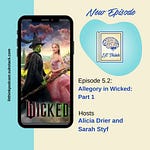Alicia and Sarah return to a discussion of history and historical fiction with the summer blockbuster Oppenheimer. They discuss what makes a good historical film, the complexities of telling the story of the atomic bomb, and the difference between truth and facts in historical fiction. At the end of this week’s discussion, they talk about the things they've been reading, watching, and analyzing outside of the classroom.
Literary terms of the week: Biopic, Historical fiction
Sign up for the newsletter and follow us on Instagram and Facebook.
Music by Craig Harmann
Cover art by Matt Holman
Show Notes:
Literary terms of the week:
Biopic: A fictional film based on the true story of a real person
Artistic License: Deviation from fact or form for artistic purposes. According to a piece by TV Tropes, “Creators are allowed to be inaccurate if the inaccuracy serves the story better than accuracy would.”
Distinctions from “IS YOUR SCRIPT "BASED ON" OR "INSPIRED BY" A TRUE STORY? WHAT'S THE DIFFERENCE?”
“Based on a true story”: the characters, storylines, and a majority of the scenes are primarily based on actual occurrences. Think Schindler’s List
“Inspired by a true story”: inspired by a specific story about a real person or people, but more liberties can be taken. Think The Pursuit of Happyness
“Based on true events”: The focus is on a true event, taking a historical event and creating a story out of it using primarily fictional central characters. Think Titanic.
“Inspired by true events”: Stories that take a true event and tell a cinematic story with nearly all fictional characters and fictional macro events. Think Top Gun
Truth and fiction in Oppenheimer - Notes from Vulture article
Film based on the book American Prometheus
Nolan chooses to tell it in a series of flashbacks. The present in is black and white, the past in color. In the present, Lewis Strauss is using his attacks on Oppenheimer to guarantee his confirmation as Commerce Secretary - when it becomes clear that he spearheaded the witch hunt against Oppenheimer, he loses Senate support. The truth is he made enemies in both scientific and political communities.
Stream-of-consciousness storytelling in film.
Scientific imagery with the splitting of atoms.
The best historical films seek truth even if they don’t get all of the facts right.
NCTE article, “Films Based on True Stories: Do Your Students Always Believe Them?”
(Podcast about Einstein’s brain - Radiolab’s G: Relative Genius)
What are we enjoying right now?
Alicia: Clark & Division (Naomi Hirahara), Fellow Travelers (ShowTime)
Sarah: Enter the Body (Joy McCullough), The Iron Claw (movie)
Related Episodes
Please “like” by clicking on the ❤ and share this post with your friends, colleagues, and fellow lit thinkers.



















Share this post